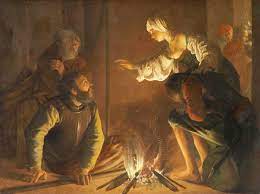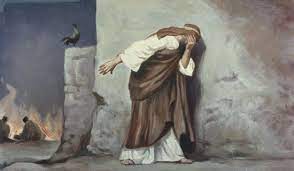The Rock Who Wept
Matthew 26:58, 69-75; Mark 14:54, 66-72;
Luke 22:54b-62; John 18:15-18 and 25-27
About 3:30 am Friday morning, the fifteenth of Nisan
The rock who wept DIG: Peter was brave enough to follow Yeshua right to the high priest’s house. What do you think Peter and John hoped to do? Why do you think Kefa disowns Jesus now? When did Peter realize what had happened? Why then? Why cry?
REFLECT: How does the story of Peter both humble and encourage you? When have you felt like Peter? When have you dealt with someone whose mind was so made up that the facts didn’t matter? How do you deal with that when it relates to your faith? What was the “rooster” in your life reminds you of failure and guilt? How did you make a comeback?
The night air was now very chilly. There was a wet wind out of the west and the guards shouldered their robes and built an open fire. They crouched around in the courtyard of Caiaphas and the glow of the coals painted their faces in brief, ruddy flicks. Then those who had arrested Jesus led Him away and took Him into the residence of Caiaphas the high priest. There all the Sadducees, Pharisees, and the Torah teachers came together (Mt 26:57; Mk 14:53; Lk 22:54a). While the trial was being held in an upper story of the high priest’s home, our attention now turns back to another important person also named Kayafa, of that fateful Passover early morning. Kefa (the same root word as Caiaphas), was still sitting outside in the courtyard.1523
When Jesus was taken prisoner, Simon Peter and John followed Him at a distance right up to the courtyard gate (Matthew 26:58). They had followed behind the raiding party and the two of them had seen their Master disappear inside the gate. They argued if they should follow Him. Because the high priest knew John, he went with Jesus into the high priest’s courtyard, but Peter had to wait outside at the gate. While Yeshua was at the house of Caiaphas, the young apostle knocked on the servant’s gate.
John spoke to a servant girl on duty there. She opened the gate a little way and, holding a lamp in her hand, looked at the face of Yochanan. She greeted him and he greeted her, and he was admitted without question because the high priest favorably knew John and his family. The young apostle wandered around the courtyard, trying to glean some useful information, and then he crouched by the fire with the others.
When John was certain that he was not suspect, he got up and spoke to the same girl servant and said that a friend of his was outside the gate. Yochanan said that he would vouch for his friend, and she brought Peter in (Lk 22:54b; Jn 18:15-16). She shaded her lamp and saw a barrel-chested man with wild dark hair and beard.

The first denial was simple: It was cold, so Simon Peter sat with the servants and the guards who were on duty in the courtyard warming himself by the fire. Somewhere, a rooster ruffled his feathers. The servant girl saw him seated there in the fire light. She gazed at him intently and said: This man was with that Nazarene. Kefa had tried to keep a low profile because he was so afraid. He wanted to know the fate of his Master, but he denied it before them all. Peter paused. He swallowed hard and glared at the girl in outrage. I don’t know or understand what you’re talking about: he roared, obviously hoping that any accusations would end right then and there (Mattityahu 26:69-70; Mark 14:54, 66-68; Luke 22:55-57; John 18:17-18).
The second denial was accompanied with an oath: As Simon Peter stood warming himself, the servant girl saw him seated there in the firelight. She looked closely at him once again and said, “This man was one of them.” But he denied it again, in the sense of an oath: I don’t know the man (Matthew 26:71-72; Mark 14:69-70a; Luke 22:58; John 18:25). But even an oath wasn’t enough to stop the accusations aimed at him.
Members of the Great Sanhedrin were arriving and they glanced briefly around as they walked across the courtyard. Some were old; some seemed young. Most seemed irritated from lack of sleep. They walked with dignity to the stairway of the high priest, their hands clutching both sides of their magnificent robes near the neck as befitting judges, and then they went up the stairway and inside.
Sanhedrin law number 4 said that there were to be no trials before the morning sacrifice, and some thought that Caiaphas would postpone the trial until after the 9:00 am Chagigah offering. Still, whether it was held now or later – no one was going to challenge the high priest because, in this matter, even the dreaded Pharisees were his allies. And if that was still many hours away, who was going to uphold Sanhedrin law and stand by the side of Jesus, crying, “Wait!” No one. The men around the fire heard a stir and they stood looking toward Caiaphas’ house. Temple guards were coming down the steps with lanterns and Yeshua was between them.

The third denial came with curses: After a little while, one of those standing there went up to Kefa and said: Surely you are one of them; you are a Galilean, your accent gives you away. The Galilean inability to properly pronounce the Hebrew gutturals showed that there were cultural differences between the local Judeans living in Jerusalem and those visiting from the north. These two Jewish groups were known to have differences, not only in some religious customs, but also in their dialects as well (Tractate Eruvin 53a). It was probably comparable to a Louisiana Jew, with his southern accent, visiting a Boston Jew, with his northeastern accent.1524
Again, one of the high priest’s servants, a relative of the man whose ear Peter had cut off, challenged him, saying: Didn’t I see you with the Nazarene in the garden” (Yochanan 18:26)? Then Peter began to call down curses on himself if he was not telling the truth, and he swore to them: I don’t know what you’re talking about. I don’t know the man (Mattityahu 26:73-74; Mark 14:70b-71; Luke 22:59-60a; Yochanan 18:27a)! The Jews had a practice of putting themselves under a curse (Acts 23:12-15). Rabbi Sha’ul called down a divine curse upon those who preached a different gospel. But even if we or an angel from heaven should preach a gospel other than the one we preached to you, let them be under God’s curse (Galatians 1:8-9). The same word for swear is the same word found in Hebrews 3:11 were God is said to swear, that is, to put Himself under an oath. Consequently, Peter declared himself to be under a divine curse if he wasn’t telling the truth. The words swear and curse are normally taken to mean a person is using profanity. But the Greek text here shows that Kefa was not guilty of that.1525
Immediately, somewhere far off, a rooster stretched himself, shook his wings and crowed. The guards passed the little fire with their prisoner on their way to the Royal Stoa to be formally charged. Jesus, in the center, turned and looked straight at Peter. The chief apostle stared stoically at the Suffering Servant in chains, and watched His back as He was led away.

Then Peter remembered the word Jesus had spoken to him: Before the rooster crows twice you will disown me three times. And he went outside, covered his face with both hands, broke down, burst into tears, ran from the scene and wept bitterly (Matthew 26:75; Mark 14:72; Luke 22:60b-62; John 18:27b). Wept bitterly is in the imperfect, meaning he continued to weep and weep and weep. His weeping pointed not only to his grief, but also to his repentance. The next several days would be beyond difficult for Kefa . . . more like crushing. But his faith, and his leadership in the messianic movement would soon be restored (see Mn – Jesus Reinstates Peter).
The gathered members of the Sanhedrin filed out of the upper story of Caiaphas’ house. They were to meet in the Royal Stoa for a formal vote. Being roused from their sleep in the middle of the night, some felt they needed to go home first to get properly dressed. Then they would trudge up the hill in the moonlight to the Temple Mount. Then up to the second floor of the Royal Stoa.
We can all relate to Peter at some point in our lives. We have all had our moments of doubt and disappointment. So it is really encouraging to see Messiah’s mercy and love toward one of His wayward children. Would I have stood with Christ during His moment of great need? I would like to think so – we all would. But sometimes our fallen nature gets in the way of our good intentions and our halo slips. Yet, we should know that God’s great love for us remains constant even when we fail Him miserably. The real question is “where are we in our relationship with Yeshua?” His hand reaches out to us even to this day.1526
Yochanan was also in the courtyard. When Kefa left to wallow in his remorse, John remained to find out what the Jewish Supreme Court would do. When word came that the miracle-working Rabbi was guilty of blasphemy, and that the judgment had been that he should die, the apostle whom Jesus loved waited long enough to get one more look at Him. Young John was close to tears as his friend was led down into the courtyard because He was bruised and dirty, with spit running down His face. Then John left. He needed wings on his young feet because there was much to do. He had to spread the tragic news among those who believed in Jesus and, sadly, he also had to run to Bethany to tell the news to Miryam, the Lord’s mother.1527



Leave A Comment